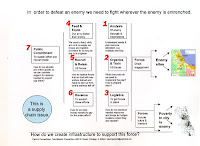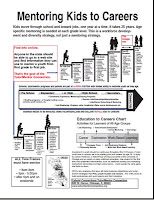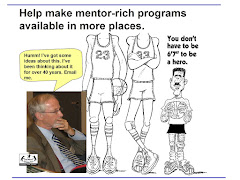When I attend meetings, conferences, etc. I am constantly taking notes on what I'm hearing, but also visualizing how this fits with my own efforts, questions I have about what's being said, and opportunities for the future. I've countless files and binders with these notes. Some times I convert some of my ideas into new graphics, and blog articles. You can see an example here.
This time I'm trying something different. I scanned my raw notes into a PDF and uploaded them to my GoogleDrive. You can see them here. If you view these, you'll see on page one, a graphic similar to the one at the left. I see the role of the organizers and partners in yesterday's meeting, as intermediaries who are trying to connect people who can help with veterans, and places who are helping veterans and their families.
If that's the case, creating a structure similar to what I've been building, which I describe below, would support their efforts.
Tutor/Mentor Institute - Learning Network Strategy by Daniel F. Bassill
This PDF describes this graphic. Since this group is composed of veterans, I feel many would relate to this graphic, and the problem solving strategy it visualizes. Visit this page and see how an intern created a video to share these ideas. Youth working with veterans could be helping communicate their ideas and strategies.
Step 7 focuses on building public commitment to generate long term support for efforts that are distributed across many organizations, in many places, for many years. This article on network building emphasizes how much the Veterans' community, and others, such as the tutor/mentor community, need to build growing support for their efforts. One of the panel members talked about how the 40 people in the room represented almost 60,000 total supporters. The 600-700 visitors to my blog each month represent many thousands more.
I've already sent a follow up to a couple of the panel members and hope that other veterans who read this article will want to help me in my efforts, and help the veterans community in what I feel is an equally important effort.
I've used this graphic often to show how communities need to support youth living in high poverty, or without enough family support, as the move from birth to adult lives and careers. I feel that if the veterans' community were to embrace this they could be building networks of support for youth before they enter the military that would already be in place as they leave their service.
I look forward to sharing my ideas and helping the veterans community because they will be helping me in my efforts if they adopt these ideas.












No comments:
Post a Comment